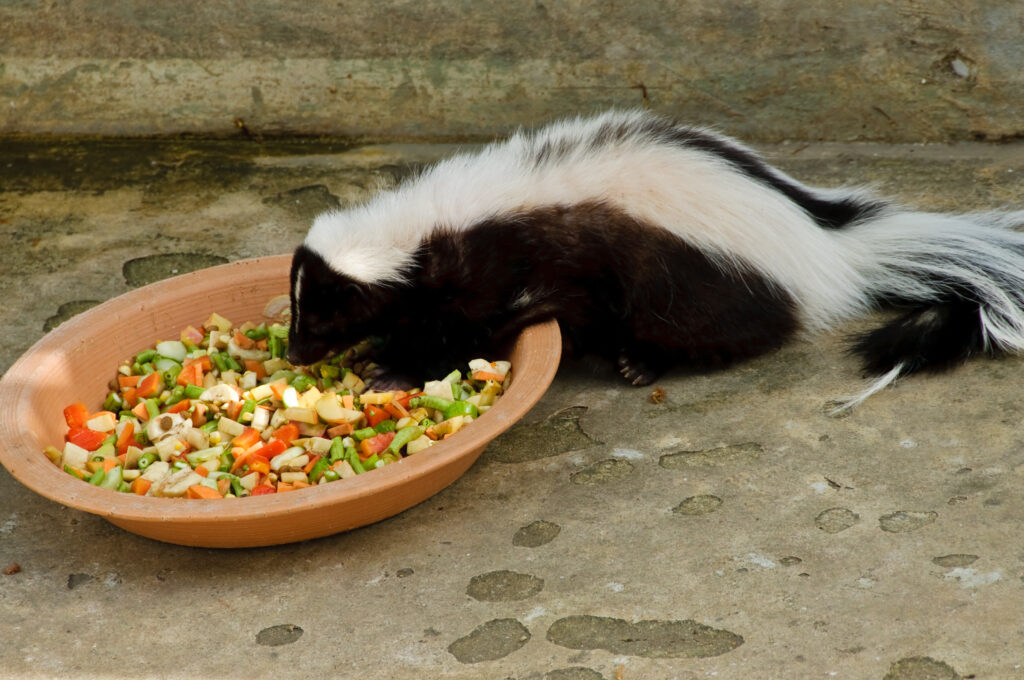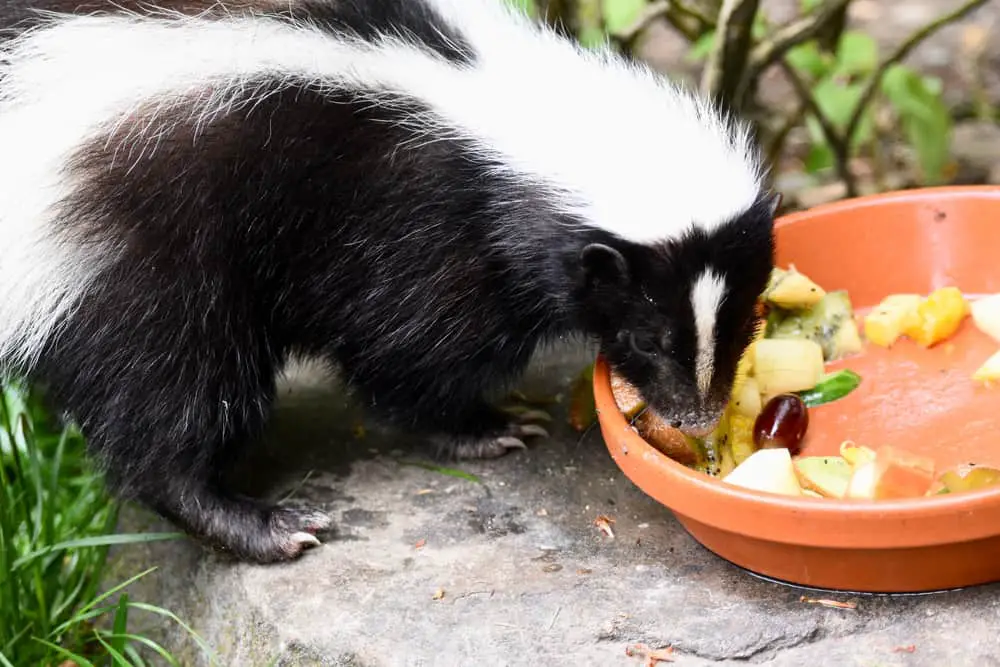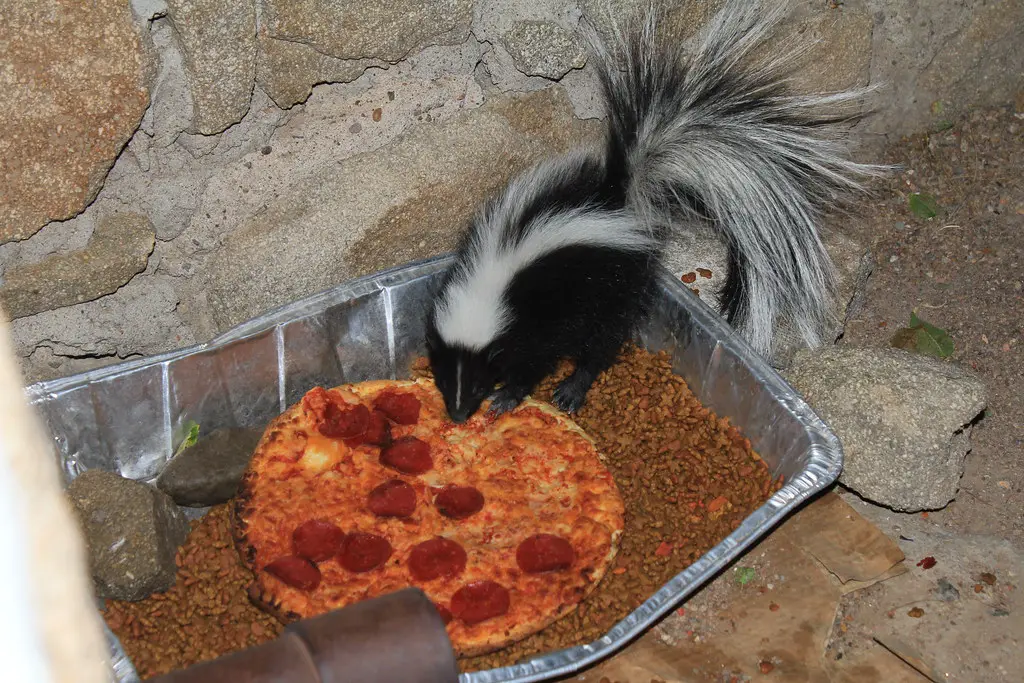Table of Contents
ToggleIntroduction

Skunks, with their distinct black and white markings and a reputation for their potent spray, are often associated with curiosity and caution. What Food Is Irresistible To Skunks? While these small, nocturnal mammals are known for their unique defense mechanism, they are surprisingly discerning regarding food. Skunks have a distinct palate, and certain foods hold an irresistible allure.
To uncover the culinary delights that captivate the senses of these charming yet misunderstood creatures. From insects to fruits and everything in between, we will delve into the world of skunk cuisine to unveil the foods that skunks find utterly irresistible and the reasons behind their delectable choices.
The Natural Diet Of Skunks
Insects and Arthropods: One of the primary components of a skunk’s diet is insects and arthropods. Skunks are excellent hunters and can precisely locate their prey, thanks to their keen sense of smell. They consume many insects, including beetles, grasshoppers, caterpillars, and more. Insects provide them with essential protein and are a major food source during the warm months.
Small Mammals: Skunks like mice, voles, and shrews have a penchant for small mammals. These critters are an excellent source of protein, and skunks are proficient hunters thanks to their sharp claws and teeth.
Amphibians and Reptiles: Skunks are opportunistic feeders for amphibians and reptiles. They will consume frogs, toads, and salamanders when available. Additionally, they may occasionally dine on snakes and bird eggs, which adds variety to their diet.
Plant Material: While animal-based foods dominate their diet, skunks consume some plant material. They often eat fruits, berries, and nuts, particularly in late summer and early fall when these resources are abundant. These plant-based foods provide skunks with carbohydrates and essential vitamins.
Human Food: Skunks often rummage through trash cans in search of food. Strong-smelling meals, including meat and dairy, tend to attract them the most. While they will consume these items if readily available, their natural diet primarily consists of the above categories.
Seasonal Variations In Diet
Spring and Summer: During the spring and summer, skunks focus on protein-rich foods, such as insects, small mammals, and amphibians. It is the time when these food sources are most abundant. Skunks are most active during the night and can often be seen foraging for these items under the cover of darkness.
Fall: Skunks shift their diet towards more plant material as fall approaches. They become less reliant on animal-based foods and consume fruits, berries, and nuts. This seasonal shift helps them fatten up for winter and provides essential vitamins and nutrients.
Winter: In the winter, skunks enter a state of torpor, similar to hibernation, but not as deep. During this period, their activity levels and food consumption decreased significantly. Skunks rely on the fat reserves they’ve built up during the fall to sustain them through the colder months. However, if the weather is mild, they may emerge to forage for the occasional meal from their dens.
Factors Influencing Skunks Food Choices
Sense of Smell: Skunks have an exceptional sense of smell, which they use to locate food sources. Their olfactory abilities allow them to identify potential meals, even if buried underground or hidden.
Individual Preferences: Just like humans, skunks can have unique tastes. While they all share a general dietary preference, some may strongly like certain foods. This individuality in food preference can be influenced by various factors, including upbringing and exposure to different foods in their environment.
Habitat: The availability of food sources in a skunk’s habitat plays a significant role in determining their diet. Skunks adapt to the food resources that are readily accessible in their specific environment.
What Food Is Irresistible To Skunks: Common Culprits
Grubs: Skunks are notorious for their love of grubs, especially the larvae of various beetle species. They can often dig up lawns and gardens for these fat, protein-rich morsels. Grubs are particularly irresistible to skunks due to their high nutritional value.
Earthworms: Earthworms are another favorite food source for skunks. They are a readily available and nutritious option that skunks can find beneath the soil’s surface. Skunks are known for their distinctive digging behavior, and their pursuit of earthworms is a testament to their fondness for them.
Small Rodents: Small rodents like mice and voles are also irresistible to skunks. These critters provide sustenance and a challenge for skunks as they showcase their hunting skills.
Berries: Skunks have a sweet tooth for berries and fruits. The mature fruits of many plants, such as blackberries, raspberries, and blueberries, attract them. While they may not be as proficient at climbing as other animals, they will still go to great lengths to enjoy these delicious treats.
Pet Food: Skunks have been observed to scavenge from outdoor pet food dishes. The strong aroma of pet food can entice them, making it a delectable option when available.
What To Avoid Feeding Skunks
While skunks have their preferred foods, it’s important to remember that they are wild animals and should not be encouraged to approach human settlements. Feeding them directly can lead to negative consequences, such as habituation to human interaction or conflicts with pets. Therefore, it’s essential to avoid feeding skunks intentionally.
Human-Attracting Delicacies

While skunks primarily feed on natural resources, they are open to scavenging for human-provided food sources. It can be a point of contention for homeowners, as skunks are known to dig through trash cans, compost heaps, and pet food dishes. Let’s explore what human-provided food items are irresistible to skunks.
Garbage and Compost: Skunks are notorious for their love of rummaging through trash cans and compost heaps. The smell of discarded food and organic waste can be irresistible to their keen sense of smell. Securing trash cans and properly maintaining compost heaps is essential to deter skunks from these food sources.
Pet Food: Skunks are not picky eaters regarding pet food. Leftover pet food or unattended food dishes can attract skunks. To prevent this, feeding pets indoors or bringing in pet dishes at night is best.
Fallen Fruits: As mentioned earlier, skunks enjoy fruits and berries. If you have fruit trees in your yard, fallen fruits can become an easy meal for these nocturnal visitors. Regularly clean up fallen fruits to reduce their attraction to your property.
Conclusion
Skunks have a unique and selective palate regarding their dietary choices. While they are opportunistic omnivores, they prefer certain foods, particularly grubs, earthworms, small mammals, and berries. Understanding their nutritional habits and the factors influencing their food choices is crucial for coexisting with these fascinating creatures while minimizing conflicts. Respect their natural dietary preferences and avoid intentionally feeding them to maintain a safe and harmonious relationship between humans and skunks in the wild.







